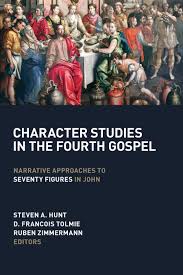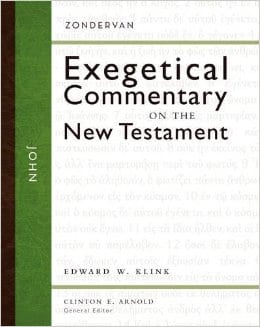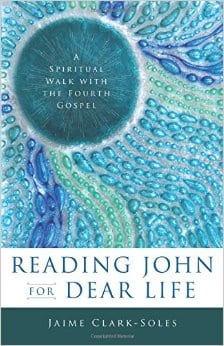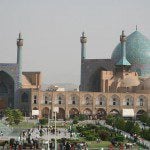In the past six months or so we have seen the publication of several interesting and noteworthy works on John. Here are some of my brief comments.
 Character Studies in the Fourth Gospel (ed. Hunt, Tolmie, and Zimmerman; Eerdmans). This is a massive, exhaustive study of all the people (named and unnamed!) who appear in John’s Gospel. The contributors are a veritable who’s who of Johannine studies including Catrin Williams, Paul Anderson, Mary Coloe, Harry Attridge, Marianne Meye Thomspon, Gail O’Day, Adele Reinhartz, Jan van der Watt and many more. And of course the esteemed Chris Skinner has penned a couple of chapters as well. At 721 pages, the work is rather encyclopedic, but very insightful and inspires the reader of Scripture to pay attention to even the “bit characters” in the fourth gospel. Highly recommended!
Character Studies in the Fourth Gospel (ed. Hunt, Tolmie, and Zimmerman; Eerdmans). This is a massive, exhaustive study of all the people (named and unnamed!) who appear in John’s Gospel. The contributors are a veritable who’s who of Johannine studies including Catrin Williams, Paul Anderson, Mary Coloe, Harry Attridge, Marianne Meye Thomspon, Gail O’Day, Adele Reinhartz, Jan van der Watt and many more. And of course the esteemed Chris Skinner has penned a couple of chapters as well. At 721 pages, the work is rather encyclopedic, but very insightful and inspires the reader of Scripture to pay attention to even the “bit characters” in the fourth gospel. Highly recommended!
 John (Edward W. Klink III; ZECNT; Zondervan). Fourth Gospel scholarship benefits from many outstanding commentaries (e.g., Thompson, Moody Smith, Brown, Keener, Lincoln, Moloney, O’Day). Klink’s massive 900+ page work is a nice contribution nonetheless. The Zondervan Exegetical series has a number of helpful features, including diagramming of passages, brief “Main Idea” notes, thorough interaction with the Greek text, and passage-level “application” sections. Klink’s volume draws out the strengths of the series. I was impressed with how Klink weaves into the detailed analysis his own theological insights, even if briefly. He also has a very good grasp of the secondary literature overall, though one can see reliance on a number of traditional works such as Barrett, John Calvin, Don Carson, Leon Morris, and Ridderbos. As far as analysis of the Greek text, I noticed close work with Wallace.
John (Edward W. Klink III; ZECNT; Zondervan). Fourth Gospel scholarship benefits from many outstanding commentaries (e.g., Thompson, Moody Smith, Brown, Keener, Lincoln, Moloney, O’Day). Klink’s massive 900+ page work is a nice contribution nonetheless. The Zondervan Exegetical series has a number of helpful features, including diagramming of passages, brief “Main Idea” notes, thorough interaction with the Greek text, and passage-level “application” sections. Klink’s volume draws out the strengths of the series. I was impressed with how Klink weaves into the detailed analysis his own theological insights, even if briefly. He also has a very good grasp of the secondary literature overall, though one can see reliance on a number of traditional works such as Barrett, John Calvin, Don Carson, Leon Morris, and Ridderbos. As far as analysis of the Greek text, I noticed close work with Wallace.
I do think Klink’s work is commendable (I expect I will consult it on all kinds of nitty-gritty questions), but I have one quibble with his book. He has chosen to use androcentral language in his translations, preferring “man” or “he/him” in places where one would expect a gender neutral term. For example, re: John 3:5, Klink offers “unless a man is born from water and spirit” where the text reads εαν μη τις γεννηθη εξ θδατος και πνευματος. Klink does this not infrequently (see p206 on 3:18). I am surprised because the NET and the NIV2011 both chose to prefer gender neutral language in cases where the reference is to anyone regardless of gender (and thus it should not be a conservative litmus test). I take this matter very seriously so this would prevent me from using this as a textbook.
 Reading John for Dear Life: A Spiritual Walk with the Fourth Gospel (Jaime Clark-Soles; WJK). This is not an academic book, but a Bible study for laypeople. It is written in an accessible and attractive writing style, but also chock full of insight. If someone from church were to ask me what they might read for Bible study, I would offer this immediately. I find that so much Bible study material out there is utter rubbish – so glad to have some trustworthy, learned-but-engaging materials to recommend. Thanks Jaime!
Reading John for Dear Life: A Spiritual Walk with the Fourth Gospel (Jaime Clark-Soles; WJK). This is not an academic book, but a Bible study for laypeople. It is written in an accessible and attractive writing style, but also chock full of insight. If someone from church were to ask me what they might read for Bible study, I would offer this immediately. I find that so much Bible study material out there is utter rubbish – so glad to have some trustworthy, learned-but-engaging materials to recommend. Thanks Jaime!











